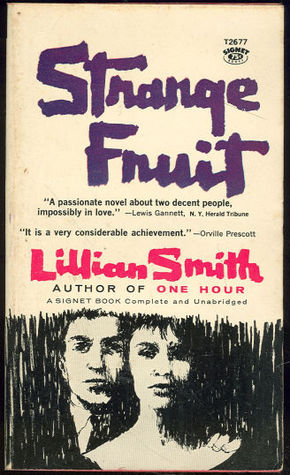“One cannot study the history taught in schools and learn about Black History at the same time.” — Lorraine Hansberry
During the formative years of my main mentor, the founder of Flannery O’Connor Academy, one of the most effective literary voices for Southern change was Lillian Smith, who with her partner Paula Snelling edited a liberal journal and ran a progressive girls’ camp near Clayton, Georgia, in the northeast corner of the state.
She was one of the first Southerners to make the point that segregation was not only unfair to black people but also destructive to everyone — that the maintenance of segregation and related hypocritical attitudes about race and sex, what she called “our twisted way of life,” had impaired the emotional development of the Southern white.
 Her position was most famously expressed in her bestselling 1944 novel, Strange Fruit, the story of two families — one white, one black — in a small Southern town, and the doomed love affair between a young white man, Tracy Dean, and a young black woman, Nonnie Anderson. The book’s characters, Smith explained, “were shaped and twisted in their learning as if their personalities had been placed in a steel frame within which they could grow, but only according to the limits defined by the rigid design of the frame.”
Her position was most famously expressed in her bestselling 1944 novel, Strange Fruit, the story of two families — one white, one black — in a small Southern town, and the doomed love affair between a young white man, Tracy Dean, and a young black woman, Nonnie Anderson. The book’s characters, Smith explained, “were shaped and twisted in their learning as if their personalities had been placed in a steel frame within which they could grow, but only according to the limits defined by the rigid design of the frame.”
Dean returns from duty in the First World War sure of his love for Nonnie, but once home slowly accepts that he cannot overcome the strictures of family and community that prohibit his marrying her. When she becomes pregnant, Tracy pays a black man to wed Nonnie for appearances’ sake, then is himself murdered by Nonnie’s brother, who is engaged at the damage and injustice done to his sister.
The book does contain an account of a lynching, but according to Philip Dray (author of At the Hands of Persons Unknown: The Lynching of Black America), Smith always maintained that the title — unlike the song popularized by Billie Holliday, written by Lewis Allan (Abel Meeropol) — doesn’t refer to lynching victims but to all Southerners who are the “strange fruit” produced by the rotten tree that was nurtured in the soil of segregation and racial hypocricy.
Virtually all Americans can be considered “strange fruit” in that sense at this juncture, collaterally damaged as a consequence of their complicity in our abominations.
Activist tactics and strategy must be considered in such a context now.
Flannery O’Connor Academy is mainly a home schooling setup for teens devoted to the kind of Liberal Arts education which makes the honoring of life effortless. This author and all the students and mentors can be reached at [email protected].











































